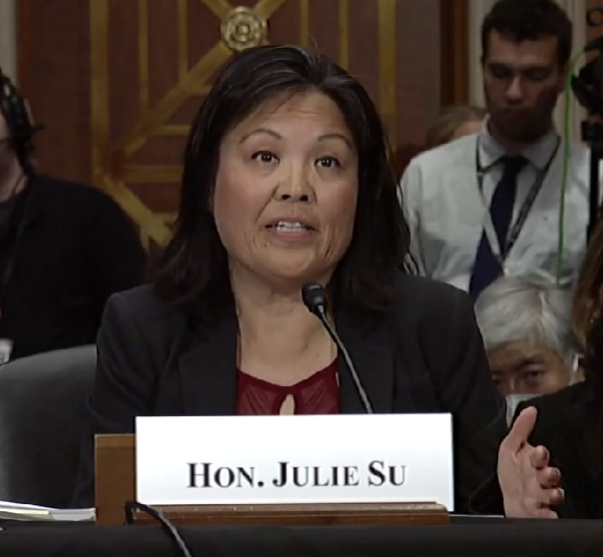Biden’s pick for the next Department of Labor Secretary, Julie Su, faced the Senate Health, Education, Labor and Pensions Committee last week in her confirmation hearing.
However, there are signs the nominee may fall short — Su’s controversial past have Republicans staunchly opposed to her confirmation and two key Democrats wavering.
Sen. Bill Cassidy (R-Louisiana), in his opening remarks as the ranking member of the committee, questioned Su’s record to Big Labor when it came to legislative and regulatory attempts to reclassify independent contractors as employees.
Cassidy said, “Eliminating freelancing is a top priority for large labor unions, those that are endorsing this nomination, want more workers paying forced union dues.”
He noted, “We should expect that the heads of our federal government are not driven by activism to carry out an agenda for a favored political group” and highlighted Su’s “no direct experience handling labor disputes should be concerning to all.”
Sen. Mitt Romney (R-Utah) had one of the toughest statements of the day when he told Su, “Work[ing] behind Marty Walsh is one thing, and to learn from him, but you haven’t had experience negotiating a major deal between unions and management, and your leadership of an enterprise resulted in $31 billion of fraudulent payments.”
Romney also pointed out that Su’s public calendar shows that Su “had a standing meeting with unions on a regular basis,” but only started meeting with business associations in the last six weeks. Romney added that the lack of dialogue between Su and businesses “sends a pretty clear message” about her bias towards Big Labor.
In response to Romney’s criticism, Su defended her time as California’s top labor official and blamed allegedly non-existent safeguards in congressional legislation as the reason behind the loss of $31 billion, which was paid out in the form of pandemic unemployment insurance claims.
Su deflected on other policy questions, such as Sen. Ted Budd’s question about whether she would endorse reclassifying independent contractors as employees. She told Budd that reclassification is “a problem in our economy that needs to be addressed,” without going into detail.
Sen. Bernie Sanders (D-Vermont), committee Chair and a longtime supporter of Su, praised her past relationship with Big Labor. Sanders said, “She’s supported by every major labor organization in this country, representing over 20 million workers including the AFL-CIO, United Mineworkers of America, the Teamsters, and the SEIU.”
Sanders called the ongoing debate over Su’s competency and qualifications as a distraction and said, with her as the next Department of Labor secretary, Su will “make it easier, not harder, for workers to exercise their constitutional right to join unions and collectively bargain for better wages, benefits, and working conditions.”
Sen. Chris Murphy (D-Connecticut) defended Su’s record on pandemic-era unemployment insurance claims and said California’s mismanagement came due to the large size of its population and the number of claims. He later asked for Su’s commitment to assist Connecticut leaders to develop apprenticeship and employment pipeline programs to staff workers in the state’s submarine construction industry, which Su committed to do if she were confirmed as Labor Secretary.
Sen. Bob Casey (D-Pennsylvania) quipped, after reading aloud the mission of the Department of Labor, “If corporations were doing their job, we wouldn’t need a Department of Labor.” Casey then added to Murphy’s defense of Su and said, “California is a huge state and it paid out more claims than anybody.”
Overall, the committee hearing was an opportunity to hear Su publicly defend her record and answer questions about her past statements and actions, which resulted in many questions about her mismanagement of California’s unemployment insurance program during the pandemic.
There remains lingering doubt whether Su’s nomination will be approved by a Senate vote, as several senators raised questions about Su’s competence during the hearing.
“Objections to Su’s nomination come from her work in California,” said AFFT Special Counsel David Osborne, “She worked to eliminate flexible, independent contract work just because it, by nature, does not mesh with heavy-handed unionization. Instead, she empowered unions to force themselves into new markets and collect more membership dues.”
Osborne added, “Based on her past, it makes sense for critics to doubt Su’s qualifications.”
If Su’s nomination passes out of committee, it will go to the Senate floor for a vote.
